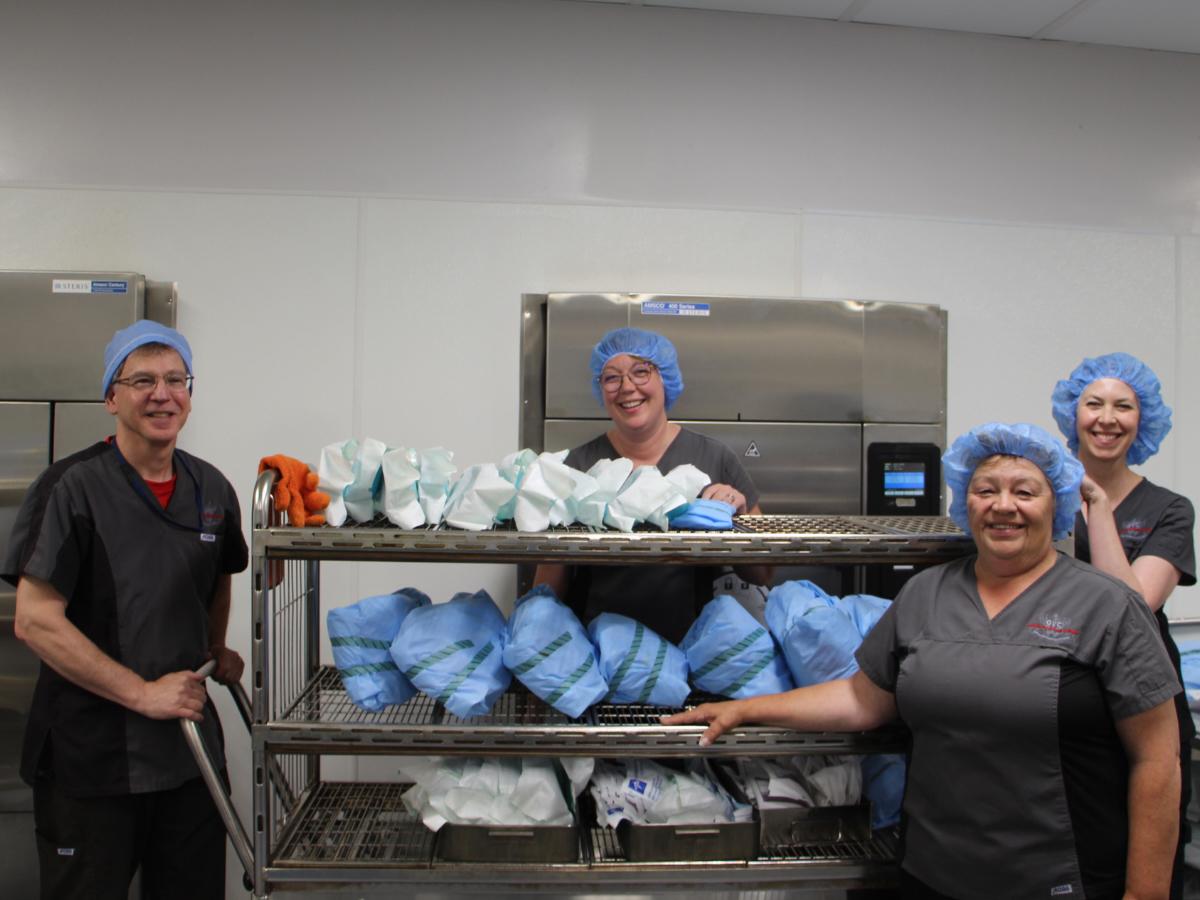The Unsung Heroes of OVC: Meet the Sterile Processing Department Team
Clients may never see the Sterile Processing Department (SPD) team, but their fingerprints are everywhere—on every successful surgery, every lifesaving procedure and every recovery story. They are the backbone of the Ontario Veterinary College’s (OVC) Health Sciences Centre (HSC), making the extraordinary work of veterinary medicine possible every day.
October 12–18 marks the Medical Device Reprocessing Week, recognizing the vital role reprocessing teams play in ensuring safe, sterile care for patients.

The OVC SPD team consists of four full-time medical device reprocessing technicians and several part-time staff members who decontaminate, disinfect, inspect, assemble, package, date and record and sterilize thousands of surgical instruments annually. They serve over 20 departments across OVC—including small and large animal surgery, intensive care unit, cardiology and HSC's specialized scope rooms, where OVC patients benefit from minimally invasive diagnostic and treatment procedures.

OVC’s SPD team follows strict protocols to maintain the highest standards of safety and sterility. Matching the standards of human health care, the team relies on state-of-the-art sterilization technologies to maintain patient safety. They operate Prevacuum Steam Sterilizers, Cart and Single-Chamber Washer/Disinfectors, a Caviwave Ultrasonic Cleaning System and a Sterrad NX100 hydrogen peroxide gas plasma sterilizer to guarantee every instrument is thoroughly disinfected and ready for use.
As HSC Chief Medical Officer, Dr. Luis Gaitero explains, the team’s impact extends to every corner of the hospital: "Every procedure in our veterinary hospital is supported by the diligence of our Sterile Processing Department. The team’s proactive and adaptable approach, particularly in times of crisis, has been exemplary. I am deeply grateful for the critical role they play in helping us achieve veterinary care excellence."
In the SPD, the margin for error is zero, and every step demands accuracy. Technicians are certified in medical device reprocessing, completing intensive coursework and examinations on microbiology, cross-contamination, instrumentation classification and sterile workflow before recertifying every five years.

Every instrument that passes through the SPD follows a strict, multi-step process—beginning with decontamination, where technicians disassemble instruments, remove all visible debris and disinfect each component. The instruments are then reassembled, wrapped, signed, dated and recorded before undergoing sterilization in autoclaves—high-pressure machines that use steam and heat (reaching up to 132 degrees Celsius) to destroy bacteria, viruses and other microorganisms.
The team also operates a state-of-the-art Sterrad 100NX sterilizer—an advanced system with five unique cycles designed to safely process delicate equipment like scopes, cameras and lithium batteries. This sterilizer converts hydrogen peroxide into vapour to fill the chamber. It is electromagnetically charged into a low-temperature plasma state, which safely and rapidly sterilizes surgical and medical equipment without leaving toxic residue. Few veterinary hospitals have access to such technology, underscoring OVC’s commitment to innovation and patient safety.
To ensure each sterilization cycle meets the highest safety standards, the SPD team also conducts rigorous biological testing. The department utilizes industry-standard Biological Indicator (BI) tests containing Geobacillus stearothermophilus—a highly resistant microorganism used to simulate the most challenging contaminants potentially present on surgical and medical instruments. These process challenge devices validate the effectiveness of each sterilization cycle, and when the BI is proven to be successfully inactivated, it confirms that the sterilization conditions were met.

Along with external visual chemical indicators placed on every package, these procedures allow SPD technicians to provide OVC’s surgical, medical and research teams with complete confidence in the sterility and quality of every instrument they use.
"We have to constantly adapt and change our strategies and our loads according to what comes in and what cases need to be in the highest priority," explains medical devices reprocessing technician Marlene Houston, who has worked in the department for more than five years. “We work very closely and collaborate with the doctors to meet the needs of whatever equipment they need to use.”
“The best thing about our team is that we work in perfect sync, just like a little orchestra. We have each other’s back! We quickly adjust to all kinds of arising situations at the hospital in order to provide the best solutions,” says Rita Kleinman.
For Houston, the highlight of working in the SPD is seeing the difference their work makes: “One of the best parts of the job is walking down to the barn and seeing our patients recovering—it reminds us how amazing this hospital is and the critical cases we help make possible.”
Her colleague Kathie Moore, with over two decades of experience in the department, sums it up simply: “I love animals...I love my job, I love the people...It’s all about the animals. It makes me feel like I’ve done my good deed.”

And for veteran technician Gerry DiCicco, the draw is the combination of people and innovation: “I love every aspect of this job—the staff, the animals, working with people throughout the whole hospital, and I really enjoy technology.”
This year, the resilience of the SPD team was tested like never before. In January 2025, OVC faced a devastating flood that left critical equipment damaged and the SPD department out of service. The team was forced to adapt overnight.
“We had to retrofit things, work with service reps closely and coordinate with many departments across campus,” recalls Houston. “We still had to support emergency surgeries and patients in need. It took incredible teamwork and patience.”
Through persistence and collaboration, the team kept essential services running, ensuring that patient care never stopped, even in the face of crisis.
Every successful surgery at the Ontario Veterinary College begins well before a patient reaches the operating room. Thanks to the precision of the Sterile Processing Department, every instrument is clean, sterile and ready for use—making safe, high-quality care possible day after day.

